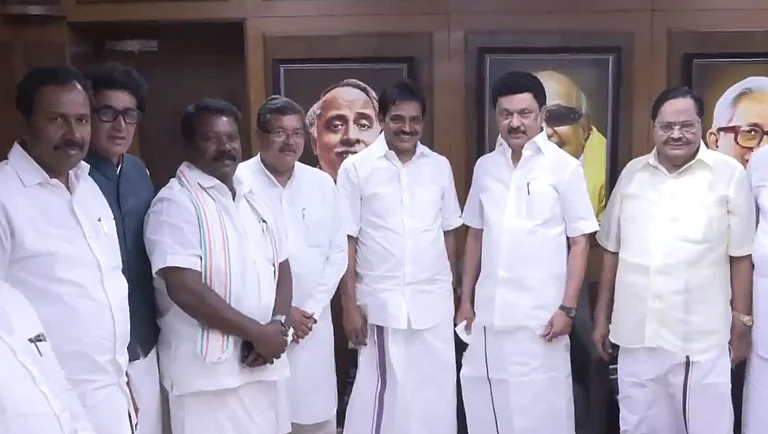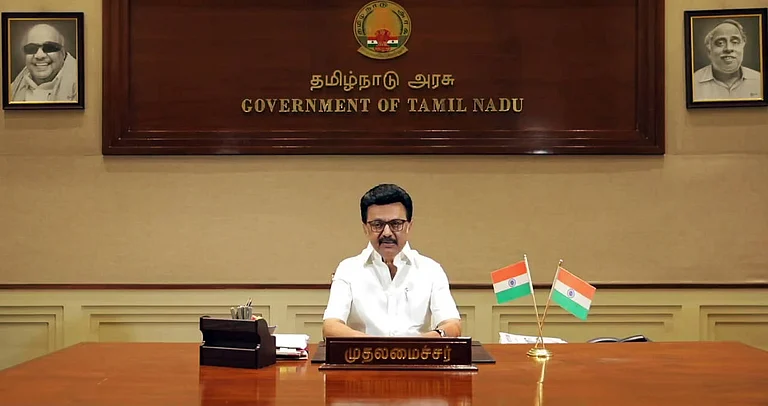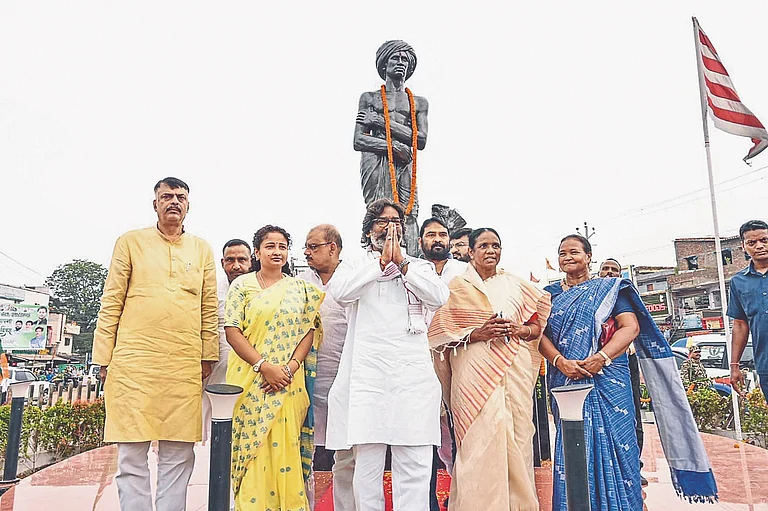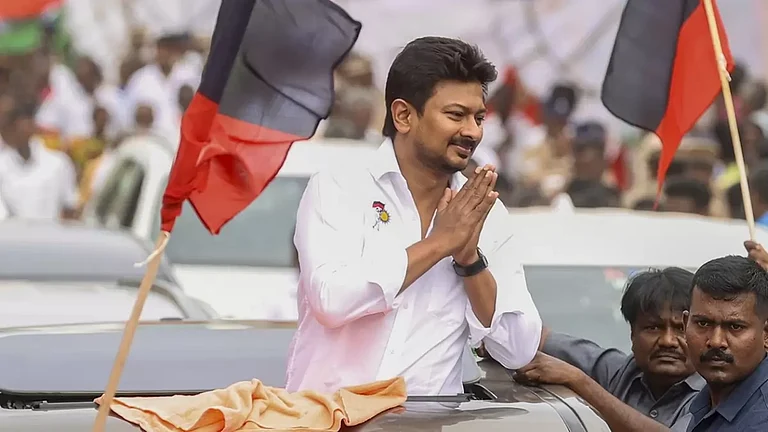Days ahead of the commencement of 2024 Lok Sabha elections, ‘sanatan dharma’ is back in news, this time in West Bengal where a BJP candidate has claimed their ancestor helped save ‘sanatan dharma’ by helping the British forces defeat Shiraj Ud Daula, the erstwhile Nawab of Bengal and its last independent ruler. The Bharatiya Janata Party (BJP) has fielded Amrita Roy, the current head of Krishnanagar’s former royal family, from the Krishnanagar seat where the TMC has fielded Mahua Moitra. Roy’s ancestor Krishnachandra is said to have supported the British in defeating Shiraj by helping Mirjafar in his betrayal of the nawab. While the TMC has amped up criticism for choosing Roy whose ancestors sided with the British, Roy said in a recent interview that Krishnachandra only sided with the British to “protect Sanatan Dharma”. "Had he not, none of us would have remained Hindus today," she said.
Politics over “sanatan” is not new in India, especially during elections. With increasing politicisation of religion under BJP rule, the issue seems to be here to stay and one that Opposition parties cannot ignore.
In September last year, months ahead of the assembly elections in five states, Tamil Nadu youth welfare and sports minister Udhayanidhi Stalin of the INDIA alliance partner, the DMK, stirred up a hornets’ nest while addressing a symposium on ‘Abolition of Sanatan’, where he purportedly compared Sanatan Dharma to “dengue, malaria or corona”, calling for the need to eradicate it. “In certain matters, mere opposition isn’t enough, we should work to end it,” he said. His comments soon snowballed into a political slugfest for the Congress and its INDIA alliance partners, including Stalin’s DMK, and the opposition parties were dubbed “anti-Hindu”. A BJP spokesperson at the time had interpreted the comments as a call for “genocide” on X (formerly Twitter). The statements were rebuked by the Supreme Court as well as Madras High Court for his comments last month. The results of the Assembly Elections 2023 in five states last year also led many observers to conclude that the controversy may have indeed helped the BJP gain votes and voter sympathy in Hindu-dominant states.
With thumping victories across three key states―Madhya Pradesh and Congress-ruled Chhattisgarh and Rajasthan―the BJP has strengthened its hold in the heartland in what some analysts have called the “Sanatan consolidation”. Among other factors, the BJP had been banking on the “Sanatan vote” for success, and the results of the elections indicate that its efforts have paid off. Chhattisgarh based political analyst Sudip Srivastava feels that the Congress’ comments on Sanatan Dharma had an impact on the Hindu Congress voters as it went against their sense of religiosity. Following Stalin’s comments, leaders, including Union Minister Anurag Thakur, slammed the Congress and its INDIA alliance partners (including DMK) for mocking Sanatan Dharma and Indian culture.
Srivastava isn’t the only one who feels that the Sanatan Dharma controversy added to Congress’ setback. Tehseen Poonawalla, popular for his political commentaries on social media and estranged brother of the BJP spokesperson Shehzad Poonawalla said that “abusing Sanatan Dharma” by the Congress was the reason for the party’s poor performance across three states.
This is not the only time that Opposition parties have faced backlash for alleged “anti-Sanatan” statements. Last year, Rahul Gandhi was criticised by BJP leaders after he tried to make a distinction between Hinduism, the religion, and Hindutva, the political strategy. Union Minister Anurag Thakur later alleged that attempts were being made to “insult” Sanatan dharma following the Congress and Shiv Sena (UBT)’s silence over Stalin’s comments. BJP president JP Nadda also accused the INDIA bloc of trying to indulge in “vote bank” politics by targeting Sanatan Dharma.
Such controversies notwithstanding, the BJP has made no bones about being the voice of Hindus since its inception, this election season being no different with the inauguration of the Ram temple in Ayodhya setting the tone for the upcoming LS polls.
Across states that went to polls last year, the party made several attempts to secure the Hindu vote, even setting the tone for the opposition to follow suit and come up with similar strategies to woo the Hindu voters.
In Madhya Pradesh, the party had been focused on pushing the “Sanatan” agenda with Prime Minister Modi as the face of the campaign. In the run up to the polls, Union Home Minister Amit Shah had addressed a rally in the Hindu-majority Chhindwara district―opposition leader Kamal Nath’s home turf―where he said that the people of MP will celebrate three Diwalis from now―one on the actual day of Diwali, the second on the day the BJP wins MP again, and the third when “Modi ji will consecrate Lord Ram in the Ram Temple in Ayodhya”. Incidentally, Kamal Nath, who has been accused by critics of playing the “soft Hindutva” card, also tried to woo the “Sanatan vote” and held meetings with several religious leaders like Pandit Pradeep Mishra among others, despite internal qualms within the Congress against some of these godmen.
In Rajasthan, incidents of communal polarisation such as the 2022 violence in Alwar, Jodhpur and Karauli; Kanhaiya Lal murder in Udaipur in December by two Muslim youth; or, the alleged demolition of temples in Alwar amid an anti-encroachment drive in April last year, seems to have had an impact on Gehlot’s hold over the Hindu right wing. Effects of polarisation were evident again in Rajasthan in the aftermath of the communal violence in Nuh, Haryana when border villages remained tense. In fact, the cases of communal flare-ups have been used by the opposition leaders in Rajasthan to attack the Gehlot government as “anti-Hindu” and being sympathetic to “rioters”. The BJP was, in turn, questioned by the opposition leaders after it elevated controversial leader, Ramesh Bidhuri, within the party ranks in Tonk, Rajasthan, days after he hurled communal slurs at a fellow MP in Parliament. The Congress under Ashok Gehlot has also invested extensively in cow welfarism and protection, much like his counterpart in Chhattisgarh.
In Chhattisgarh, analysts believe that the BJP has benefited from the clashes between Christian tribals and indigenous/Hindu tribals, with many of the former accusing right-wing organisations like the Janjati Suraksha Manch and others of fanning the violence for political purposes. In non-tribal belts, the BJP’s promise to develop five Shakti Peeths across Chhattisgarh and the Ram Lalla Darshan scheme for the poor people of the state to visit the Ram temple in Ayodhya seems to have tugged at hearts, trumping Baghel’s personal Hindu credentials.
What does this mean for India in the 2024 elections in which the BJP-led NDA alliance is hoping for a hat-trick?
Interpreting election results is a complex and multifaceted task and zeroing down to one or two factors as the key drivers of elections is often an inaccurate way to understand or predict trends. Political observers remain wary of looking at the assembly elections as the “semi-final” for the 2024 Lok Sabha polls, and history shows that voting patterns or voter behaviours differ widely at the local, state and national level elections with several regional variations. The growing imprint of the BJP in the Hindi heartland is nevertheless a reminder for Congress and other opposition parties to rethink their strategies ahead of the crucial polls, which it can do only if it learns how to read and decode the opponent’s strategy.




























